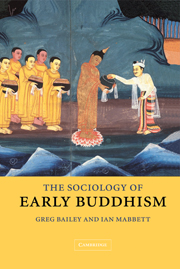
So, while browsing links after searching google for "sociology, buddhism," this book came up. Being a sociology major, and very interested in how sociologists approach (if they do...) eastern contemplatives, I was excited at the discovery of "The Sociology of Early Buddhism," by Greg Bailey and Ian Mabbett. I browsed through the pages and started reading the first 15 (As they skip a few after that, insisting you buy the book to read it). At any rate, they began to discuss an apparent "problem" in understanding how and why Buddhism arose in ancient India. I had some trouble understanding what the problem was until they wrapped up the issue in a single paragraph (A rare treat for scholarly books):
"...Buddhism to have been something which, in its origin, it was not. In its origin it was a message for those who wished to forsake society, abandoning everything. It was not a rationale for the ambitions of holders of power and magnates. The gap between the austere ascetic impulse and the needs of expanding urban kingdoms is great indeed."
They continue to re-emphasis this point, sometimes in short paragraphs, other times in long, drawn out pages. Alright, well fair enough point, BUT wasn't Buddhism from its very start, a practice of the "middle way?" In other words, it wasn't about extreme abandonment or extreme indulgence. Have these authors included in their analysis, an understanding of Buddhist teachings? Or are they scratching at surfaces (Historical context, sociological concepts, etc). The more I seemed to read, the more I felt that the authors were setting up a false polarization of city vs. rural, ascetic vs. king. A book that helped me realize that this wasn't a centralized issue in understanding how Buddhism arose was Karen Armstrong's "The Buddha." Although her book is a little heavy with info and terminology, she writes the story wonderfully and really helps the reader understand how it all began.
The beliefs of the people at that time were ripe for a practice that would liberate themselves from "dukkha," which stemmed from a belief that suffering wasn't just in this life, but in others as well. You lived many lives and what you did here and now was a result of your own actions. At any rate... There were many different schools at that time, and Buddha himself wandered through 'em. India was ripe with a desire for liberation. This is somewhat of a cultural context, and C. Wright Mills' "sociological imagination" calls us to really try and walk in their shoes to understand it.
And second point, just scratching the surface of this book, did they review what the Buddha's own understanding was? His own teaching professes that one could achieve a "transpersonal" state of awareness in which one would be liberated from all objects that arise - whether it be another human being or a tree, or even a hot meal. But, having gone through his own testing, he realized one could not jump to an extreme. It wasn't a matter of "rejecting" society outright and completely, but embracing all things by not being attached to them. This principle, if you will, made Buddhism strongly appealing. It helped Buddha see through his own ego, more easily connect with his listeners and monks, and sway even the greatest of kings (Which, mind you, were also heavily religious). If you want to understand why Buddhism is appealing, you can't reject the essence of Buddhism itself. You can look at the historical context, the economic context, the sociological context, but feel free to dive into the teaching itself and explore what the meaning could do to a society that was ready and willing to explore good wisdom.
Alright, the rant review is over. If I can get through the rest of this, I'll try and see if there is anything I was dead-wrong about. So far though, I'm just a wee bit disappointed.



